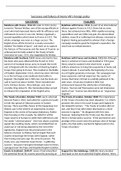Successes and failures of Henry VIII’s foreign policy
SUCCESSES FAILURES
Relations with France, 1512-13: Later in 1512, Henry Relations with France, 1512: As part of an international
turned to Thomas Wolsey, one of the young officials at alliance against France in 1512, Henry led an army
court who had impressed Henry with his efficiency and there, but achieved very little. With rapidly increasing
enthusiasm to serve in any role. Wolsey organised a expenditure and very little real gain, the demoralised
second expedition which went to France in 1513. The soldiers, many ill or suffering from disease, returned to
whole campaign was seen as a huge success. The England. Having persuaded his advisers that a foreign
English drove off the French in a cavalry encounter campaign would be good for England’s reputation, the
dubbed “the Battle of Spurs”, and went on to capture result was an embarrassment.
the fortress of Therouanne and the town of Tournai- an
achievement formally sealed in the Treaty of Saint
Germaine-en-Laye, 1514, also negotiated by Wolsey.
Relations with Scotland, 1513: Henry also had to face Relations with France and Scotland, 1512-14: Although
the Scots who were allied with the French in 1512. Henry’s victories in France and Scotland in 1513 gave
James IV of Scotland led an army to invade the north- Henry what he wanted in the short-term- a quick
east of England with the intention of diverting English military adventure to bring him popularity at home and
troops from going to France. This resulted in the Battle respect abroad- it was hardly the beginning of a new
of Flodden (September 1513), which has been referred era of English greatness in Europe. The campaigns had
to as the last large-scale medieval-style battle in been expensive and had wiped out the surplus of
England. The English lost 1,500 men, but the Scots are money that Henry VII had so carefully gathered in his
said to have lost about 10,000. These included nine later years. It had also resulted in little real
Earls, thirteen barons, three bishops, and, most achievement beyond the satisfaction of defeating
crucially, King James IV- this tremendous blow served France. Tournai and Therouanne were not impressive
to enhance the reputation of the English army. spoils of war- Tournai was described as an “ungracious
doghole”.
The Treaty of London, October 1518: Leo X, who had The Treaty of London, October 1818: The importance
become Pope in 1813, had called for a general crusade of the Treaty of London has been disputed. T.A. Morris
to halt the spread of Ottoman power in Eastern presents this view in his novel Europe and England in
Europe. There was little chance of this happening, but the Sixteenth Century: “The Treaty of London did not
Wolsey saw in the scheme an opportunity to place last, and thus it has often been dismissed as a mere
England at the centre of European diplomacy. Rather exercise in egoism.” He disagreed with this view,
than focusing on the crusade, he called for all the however, believing that the Treaty was the climax of
major powers of Europe to settle their differences and Henry’s foreign policy success: “If the prominence and
live under “universal peace”. Over two dozen countries prestige of the crown were the primary aims of foreign
signed the resulting treaty, which committed them to policy, the that policy reached its highest point in the
avoid war or risk being attacked by the rest of the Treaty of London.”
signatories; England was the pivotal point in this
balance of power as Wolsey had arranged that each
country should sign the treaty with England, rather
than having everyone sign the same document. The
treaty was, says historian Susan Doran, “a glittering
success”, because it brought immediate fame to Henry,
upstaged even the Pope and dispelled English isolation.
Events in Scotland, 1540-47: James V had intensified Support for the Habsburgs, 1520-25: Henry decided
the potential threat his country posed by pursuing an that Spain as the more potential English alliance. Henry





